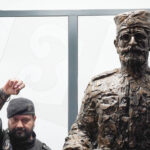- Tirana hosts European Political Community summit
Leaders from across the continent gathered in Tirana on May 16 for the sixth summit of the European Political Community (EPC). The meeting, under the theme “New Europe in a new world: unity – cooperation – joint action”, brought together heads of state and government from 47 European countries, including the Western Balkans and Ukraine, as well as chiefs of European institutions. The EU was represented by European Council President António Costa, who co-chaired the summit along with Albanian Prime Minister Edi Rama.
The plenary session and round tables were devoted to migration, youth issues, democratic sustainability, and economic security, but the main topic revolved around the challenges to European security, primarily Russia’s war of aggression against Ukraine and the need to strengthen Europe’s defense capabilities.
“Europe must succeed in bringing a just and lasting peace to Ukraine. International law must prevail. And we know, dear Volodymyr (Zelenskyy), that your security is also our security. Europe must also invest more in its own defense, because we have learned that peace without defense is an illusion,” Costa emphasized in his opening remarks.
The Albanian Prime Minister chose a more philosophical tone, recalling the recent history of the Western Balkans as a lesson in the value of peace. “The enemies of peace should not drag us into the glorification of weapons. Here in the Balkans, we have survived war, bombs, territorial conflicts, destruction, and disruption. It happened in our lifetimes, not in some distant black-and-white documentary archive. And we have learned that peace has no competitors. Perhaps, that is why hope in that other Europe is greatest here,” Rama emphasized.
Albanian media called the summit a symbolic meeting that demonstrated continental unity in the face of geopolitical instability, noting that the summit conveyed a message of strategic solidarity against Russian aggression and the erosion of democratic norms.
The summit, which took place just a week after Albania’s parliamentary elections, also offered an opportunity for the new/old government led by Edi Rama’s Socialist Party to prove to the EU its commitment to the European path and his country’s position as a leader in European integration.
- Kosovo’s newly elected parliament unable start work
The newly-elected parliament in Kosovo has been struggling for over a month to launch its work due to its inability to elect a speaker. Kosovo’s parliamentary elections were held back in February.
Almost two dozen times, deputies have gathered for constituent sessions, yielding no result. On May 21, another attempt to elect a speaker failed, again.
The Self-Determination Movement of acting Prime Minister Albin Kurti, who won the most votes in the February elections, insists that acting Justice Minister Albulena Haxhiu should take the speaker’s seat. Opposition parties are blocking that pick. After 18 unsuccessful attempts to elect a candidate from the Self-Determination movement, opposition party leaders are calling on Kurti to propose someone who can win a majority, while the Self-Determination leader remains `.
Kosovo President Vjosa Osmani has expressed concern about the delay in establishing new institutions after the February elections. She stressed that Kosovo citizens are paying for this political impasse, as there is still no functional parliament that could ratify international agreements and adopt legislation necessary for the country’s development.
“Free and democratic elections were held in Kosovo in February this year, and after some time the election results were approved. On April 15, the first parliament session took place, which marked the first attempts to start work and form a government. A month in, unfortunately, any success is yet to be seen. …As President, I am concerned about these delays, because the burden of these delays is borne by the citizens of Kosovo,” Osmani stressed.
The president warned that a prolonged blockage of parliament could have grave consequences for the country, including a delay in EUR 900 million payments from the EU, slowing down the process of gaining membership in international organizations, and reducing public trust.
- Alliance for Albanians chief leaves North Macedonia’s ruling coalition
North Macedonia’s Minister of Health and head of the Alliance for Albanians, Arben Taravari, unexpectedly resigned on May 15, withdrawing from the Vlen/Vredi bloc of Albanian parties, which is part of the ruling coalition.
According to one version, Taravari resigned due to a conflict over the distribution of budgeg money in a tender.
According to another version, the resignation was due to the announcement that the Alliance for Albanians would join a coalition with the opposition Albanian party DUI (Democratic Union for Integration) and the European Front (a coalition of Albanian parties) in the upcoming local elections.
“I think Mr. Taravari and someone from his entourage are determined to return to the arms of (DUI leader) Ali Ahmeti. I can only wish him luck,” said the Prime Minister of North Macedonia and the leader of the ruling VMRO-DPMNE party, Hristijan Mickoski.
Despite crisis in the the Albanian bloc, rallied around Vlen, analysts tend to believe this will not lead to an institutional crisis in North Macedonia. According to estimates, the government majority will be preserved.
Maria Miteva, a government spokeswoman and member of the VMRO-DPMNE party executive committee, said on May 20 that the VMRO-DPMNE-led government is fully stable, continuing to work dedicatedly for citizens’ benefit.
- Serbian authorities outraged by court ruling regarding protesters
Serbia’s president, ruling party leader, and justice minister have harshly criticized a court ruling to transfer three anti-government protesters from custody remand to house arrest, accusing judges of siding with “terrorists”.
Protests in Serbia initially started after a canopy collapsed at a Novi Sad rail station last November. The protesters, mostly students, demand that all those responsible for the tragedy be held accountable.
The three suspects, Marija Vasic, Lazar Dinic and Lado Jovovic, were arrested in March on charges of subversive activities. The Novi Sad Court of Appeals on May 20 granted the appeals filed by the defendants’ lawyers and ordered that the three suspects be placed under house arrest with ankle monitors for a period of at least three months.
Representatives of the ruling Serbian Progressive Party expressed outrage at the court’s judgments, which they see as too lenient.
“The release of terrorists and the detention of our [party] members for several months simply because they protected our premises from blockaders and bandits best shows that a part of the judiciary is directly involved in the attempt to pursue a color revolution,” former Prime Minister and President of the Serbian Progressive Party Miloš Vučević wrote on X on May 20.
Members of the Serbian Progressive Party that Vučević mentioned were detained on suspicion of attacking student protesters in Novi Sad in January. The incident led to Vučević’s resignation as prime minister.
Serbian Justice Minister Nenad Vujić on May 21 called on the Supreme Judicial Council, the country’s independent judicial oversight body, to “investigate the circumstances” under which a court transferred three individuals suspected of “crimes against the constitutional order” from pretrial custody remand to house arrest.
Serbian President Aleksandar Vučić, in a statement to the pro-government Informer TV channel, accused the judges of “criminal acts”, adding that members of the Serbian Progressive Party accused of attacking student protesters “are in custody for nothing.” In an Instagram post, Vučić referred to the alleged perpetrators of the attack on the students as “heroes.”
The trial of four activists of the Serbian Progressive Party, who are accused of attacking protesters in January this year, will kick off in the Novi Sad court on May 28.
- Budgetary financing of parties to be stopped in Republika Srpska
The National Assembly of Republika Srpska, at an extraordinary session on May 21, adopted the Law on Financing of Political Parties to abolish budgetary financing of all parliamentary parties in Republika Srpska.
Opposition parties in Republika Srpska opposed the new piece of legislation, saying that it would lead to them being deprived of funds for their current activities, and also accusing the government of seeking to destroy the opposition. These forces have also put forward a claim that the parties from the ruling coalition in Republika Srpska get “shadow” financing from state-owned companies, which political organizations close to the government receive through corrupt schemes.
The ruling coalition initiated the adoption of the law on financing political parties after the High Representative in Bosnia and Herzegovina, Christian Schmidt, banned financing of the Union of Independent Social Democrats, led by Milorad Dodik, and the United Serbs of Nenad Stevandić from the budget at all levels of government in Bosnia and Herzegovina. Schmidt said the move was due to the actions of these two parties aimed at destroying the constitutional order in Bosnia and Herzegovina.



